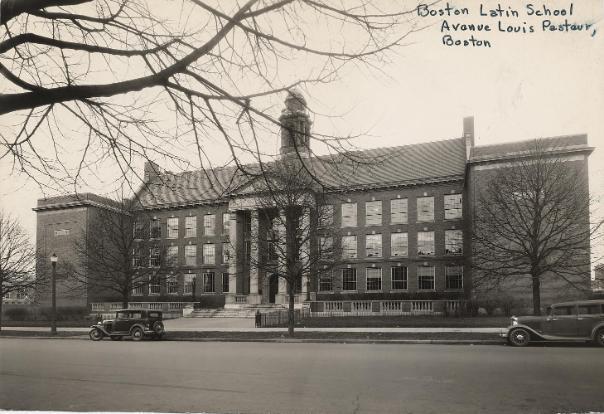Boston Latin School, established in 1635, holds the distinguished title of the nation’s first public school, a cornerstone in American educational history. As researchers and historians delve deeper into archival records and newly uncovered documents, the rich legacy of this venerable institution is coming to light, revealing its pivotal role in shaping public education and nurturing some of the country’s earliest leaders. This investigative report uncovers the profound impact Boston Latin School has had over nearly four centuries,illuminating its origins,evolution,and ongoing influence in the fabric of American society.
Table of Contents
- Boston Latin School Origins Trace Back to Early Colonial Education
- Influential Alumni Who Shaped American History
- Preservation Efforts Highlight Architectural and Cultural Legacy
- Recommendations for Engaging Community in Historical Education Initiatives
- In Retrospect
Boston Latin School Origins Trace Back to Early Colonial Education
Founded in 1635, Boston Latin School stands as a pioneering milestone in American education, marking the nation’s first public school. Established during the early colonial era, its creation reflected the Puritan commitment to literacy and classical learning, aiming to prepare young men for leadership and higher education. The school’s curriculum initially emphasized Latin, Greek, and Scripture, mirroring the educational priorities of the time and setting a precedent for subsequent public schooling in the New World.
The school’s legacy extends beyond its antiquity; it became a blueprint for colonial education systems, embodying core values such as discipline, rigorous academics, and civic responsibility. Alumni of Boston Latin include some of the most influential figures in American history,an enduring testament to the institution’s impact. Highlights of its early educational framework included:
- Classical Languages: Intensive study of Latin and Greek to foster critical thinking and eloquence.
- Moral Instruction: Emphasis on religious and ethical instruction aligned with Puritan values.
- Civic Preparation: Training students for roles in public service and leadership.
This foundation laid by Boston Latin continues to influence modern public education, underscoring its vital role in shaping the intellectual landscape of colonial America.
Influential Alumni Who Shaped American History
Boston Latin School’s alumni roster reads like a who’s who of American history, producing figures whose legacies have rippled across centuries. Among the most notable is John Hancock, whose bold signature on the Declaration of Independence continues to symbolize American freedom. The school also counts Samuel Adams, a key architect of the American Revolution, among its distinguished graduates. These leaders did not merely witness history-they actively shaped the birth and trajectory of the nation, embodying the school’s mission to cultivate civic responsibility and intellectual rigor.
Other influential alumni include:
- Benjamin Franklin – polymath and founding father, whose innovations and diplomacy helped lay the groundwork for the new Republic
- Paul Revere – famed patriot whose midnight ride alerted colonial militias of approaching British forces
- Samuel Scudder – pioneering scientist contributing to early American academic thought
These figures exemplify how Boston Latin School’s rigorous classical education served as a springboard for leadership in politics, science, and social reform, leaving an indelible imprint on America’s cultural and political landscape.
Preservation Efforts Highlight Architectural and Cultural Legacy
The Boston Latin School stands as a beacon of early American education, its preservation efforts meticulously safeguarding both its architectural integrity and its profound cultural significance. Recent initiatives have focused on restoring the original 17th-century features while integrating modern preservation technologies to prevent deterioration. These efforts not only honor the nation’s first public school but also preserve an authentic piece of Boston’s colonial-era heritage, reflecting the city’s revolutionary spirit and educational legacy.
Community and historical organizations have championed several key projects, including:
- Structural stabilization: Reinforcing the school’s foundational elements to prevent damage from urban development and environmental factors.
- Archival documentation: Digitizing historical records and artifacts to enhance public access and educational engagement.
- Public programming: Hosting lectures, tours, and exhibitions that illuminate the school’s role in shaping American education and civic ideals.
These preservation endeavors ensure that the Boston Latin School remains more than a historic site; it serves as a vibrant monument to the enduring values of education and community resilience embedded in Boston’s fabric.
Recommendations for Engaging Community in Historical Education Initiatives
Fostering community involvement in historical education demands innovative approaches that connect residents with the rich legacy of institutions like Boston Latin School. Collaborative efforts with local organizations and cultural groups can amplify outreach, transforming history from abstract lessons into shared experiences. Hosting interactive events such as historical walking tours, public lectures, and student-led exhibitions encourages active participation and personal investment in preserving the city’s pioneering educational heritage.
To deepen engagement, it is essential to leverage digital platforms that invite dialog and storytelling beyond the classroom. Implementing initiatives that embrace diverse perspectives-incorporating voices from across Boston’s communities-creates a dynamic learning surroundings.Key strategies include:
- Community workshops highlighting archival discoveries and the evolution of public education as 1635
- Partnerships with local historians and educators to develop inclusive curricula reflecting multiple narratives
- Interactive multimedia campaigns that make historical content accessible and compelling for all age groups
In Retrospect
As the nation’s first public school, Boston Latin School stands as a testament to the enduring value of public education in America. Its rich history not only reflects the beginnings of a pioneering educational tradition but also highlights the evolving story of Boston itself – a city steeped in revolutionary ideals and cultural transformation. Uncovering the history of Boston Latin School offers more than a glimpse into the past; it provides insight into the foundations of public schooling that continue to shape generations today. As Boston moves forward, the legacy of its first public school remains a vital chapter in the city’s ongoing narrative.

